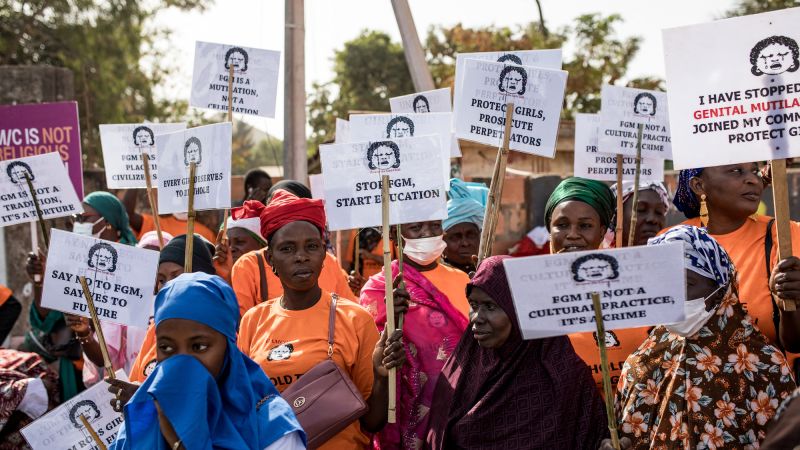Muhammadou Bitaiye/AFP/Getty Images
Anti-female genital mutilation (FGM) protesters hold placards outside Parliament building in Banjul, Gambia, on March 18, 2024.
CNN
—
Gambia’s parliament has voted in support of landmark legislation banning female genital mutilation (FGM) in the Muslim-majority country, following calls by religious groups for the law to be repealed.
Had Monday’s attempt been successful, the small West African nation would have become the first in the world to relegalize FGM after criminalizing it.
Rep. Amadou Camara, chair of the Joint Committee on Health and Gender, which recommended that FGM remain illegal, told CNN that none of the clauses in the Women (Amendment) Bill 2024 calling for the lifting of the ban on FGM had been passed.
Parliament Speaker Favakali Jatta ruled it was “impossible” for the bill, which passed second reading four months ago, to be passed through a third reading without these provisions. “The bill is rejected and I consider the legislative process exhausted,” Jatta said during a plenary session on Monday.
FGM was banned in Gambia in 2015 by former President Yahya Jammeh. Penalties of fines and imprisonment may be imposed. Individuals involved face up to three years in prison.
Under this law, if the act results in death, the perpetrator will be sentenced to life in prison.
Islamic advocacy groups and lawmakers Pushed back He opposed female circumcision as a crime, “One of the virtues of Islam”
Prominent Gambians, including opposition leader and former interior minister Mai Ahmad Fatty, Defending this practice, “FGM is not practiced in The Gambia. We practice circumcision, not excision,” they insist.
Human rights group Amnesty International has previously called efforts to roll back the ban on FGM a “setback” for human rights in the country, where 73% of women aged 15-49 had undergone FGM as of 2020. according to To the United Nations.
According to the UN, more than 65 percent of these women were subjected to the practice “before the age of five.”
UN Secretary-General Antonio Guterres Said On International Women’s Day in March, she said she was “outraged” by the Gambian parliament’s move to legalise FGM, describing the practice as “horrifying”.
Despite the ban, FGM is still practiced on children in some parts of the country. Last year, three women were convicted of performing the practice on eight underage girls and were sentenced to fines of approximately 15,000 Gambian dalasis ($220) or one year in prison each. Penalties include: report The money was allegedly paid by a Muslim cleric.
In 2016, two women Indicted After a five-month-old girl died from genital mutilation.


